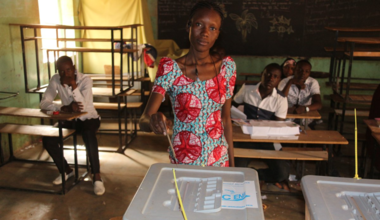Joint efforts pledged to combat drug trafficking and organized crime in West Africa
Dakar, 20 June 2011 - On the occasion of the inaugural session of the High-Level Policy Committee of the West Africa Coast Initiative (WACI POLCOM),
the United Nations System, the International Criminal Police Organization (INTERPOL), the Economic Community of West African States (ECOWAS), as well as Ministers of Interior or Justice of the Governments of the four pilot countries - Côte d’Ivoire, Guinea Bissau, Liberia and Sierra Leone - reiterated today their commitment to jointly fight the scourge of drug trafficking and organized crime in West Africa. The sub-region is recognized as a transit route for the cocaine trafficking from Latin America to Europe as well as a hub for counterfeit medicines, cigarette smuggling and other crimes, which pose a serious threat to peace and security in the sub-region and constitutes an impediment to development.
The first WACI POLCOM - chaired by Mr. Said Djinnit, the Special Representative of the UN Secretary-General for West Africa - aims at setting the strategic direction of the joint initiative supporting the ECOWAS Regional Action Plan to address the growing problem of illicit trafficking, organized crime and drug abuse in West Africa. The meeting was attended by WACI partners as well as the UN Peace Missions assisting the Governments of the pilot countries. High-level representatives from the Peace Building support Office (PBSO), the African Union (AU) and the European Union (EU) attended as guest participants, while representatives of the diplomatic corps and donors based in Dakar were present at the opening and closing ceremonies.
The WACI POLCOM reviewed the achievements and challenges of WACI’s implementation in the pilot countries and welcomed progress made in the development of Transnational Crime Units (TCUs) in Sierra Leone, Liberia and Guinea Bissau. Delays in the implementation in Côte d’Ivoire were attributed to the recent post-electoral crisis. The WACI POLCOM therefore decided to launch a new assessment mission to Cote d’Ivoire, taking the new political context into account, with a view to hastening the implementation process of the TCU. The participants also agreed to invite Guinea to join the Initiative as the fifth country.
The participants welcomed the commitment of ECOWAS authorities in mobilizing West African countries in the fight against transnational organized crime and underlined the importance of the close collaboration with WACI. The POLCOM adopted a set of recommendations including the holding of a donor conference to gain wide international financial support to concrete WACI activities, in direct support to implementation of the ECOWAS Action Plan.
Ms. Judy Cheng-Hopkins, the Assistant Secretary-General leading the Peace Building Support Office (PBSO) pledged to support WACI and to facilitate the mainstreaming of the fight against transnational organized crime into peace building strategies.
Mr. Michael Olmsted, Special Representative of INTERPOL to the UN reiterated commitment to WACI and alluded to both the skill and the will that are necessary to combat organized crime and welcomed the participation of ECOWAS, Minsters and Representative of the diplomatic community to the POLCOM. He said that it demonstrates the political will that will be necessary to support the enhanced skills that WACI promises to provide to police.
Ms. Dominique Dellicour, representing the European Union expressed the willingness to reinforce strategic collaboration with WACI. She announced the current finalization process of a 13 billions FCFA (20 million €) contribution to the ECOWAS Regional Action plan through The Regional Indicative Program. This will constitute a major breakthrough in the fight against drug trafficking and organized crime and would adequately complement WACI.
Ambassador Akin O Fayomi, Special Representative of the African Union (AU) called for greater commitment to address the magnitude of this threat to peace and security including convening a special meeting at appropriate level.
Finally, Ms. Adrienne Diop, ECOWAS Commissioner for Human Development and Gender recognized the key role WACI within the framework of the ECOWAS Regional Action Plan and welcomed the support of the international community. She stressed the need to continue to combine efforts in the fight against drug trafficking and organized crime for the sake of West Africa’s stability and development.
Background
A 2009 UNODC report "Transnational Trafficking and the Rule of Law in West Africa: a Threat Assessment" shows that in some cases, the value of illicit flows through the region surpasses the combined gross domestic product (GDP) of the West African States, which are among the world's poorest countries. For example, the value of 45 million counterfeit antimalarial tablets ($438 million) is greater than the GDP of Guinea-Bissau. Revenue from cigarette smuggling (around $775 million) is greater than the gross national product (GNP) of the Gambia. Illicit income generated from illegal oil bunkering or cocaine trafficking (approximately $1 billion each) rivals the GNP of Cape Verde or Sierra Leone.
The West Africa Coast Initiative (WACI) was jointly launched in 2009 by the United Nations Office on Drugs and Crime (UNODC), the UN Department of Peacekeeping Operations (DPKO), the UN Department of Political Affairs (DPA)/UN Office for West Africa (UNOWA) and INTERPOL. WACI is a response to the need to adopt a multi-stakeholders approach to support the ECOWAS regional action plan to address the growing problem of illicit trafficking, organized crime and drug abuse in West Africa. The cornerstone of WACI is the establishment of transnational crimes units (TCUs), which are national specialized multi-agencies to combat transnational crime. Capitalizing on the presence of UN missions, WACI has been initiated in four pilot countries also considered as priority affected countries by ECOWAS i.e. Cote d’Ivoire (UNOCI), Guinea Bissau (UNIOGBIS), Liberia (UNMIL) and Sierra Leone (UNIPSIL). The objective is to expand the initiative to other West African countries.
 UN
UN





